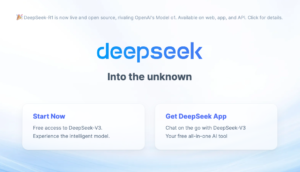In the ever-evolving landscape of technology, few fields have undergone as rapid and transformative a change as Artificial Intelligence (AI). Central to this progress is the relentless pursuit of deep research—a commitment to not only understand but fundamentally expand the boundaries of what AI can achieve. OpenAI, a pioneering force in this domain, exemplifies this dedication through its innovative models like the O3 Mini Medium and O3 Mini High, alongside a profound focus on deep research. This exploration delves into how OpenAI’s emphasis on deep research is shaping the future of AI and, by extension, the world.
The Essence of Deep Research in AI
Deep research in AI transcends minor improvements and optimizations. It involves fundamentally rethinking computational paradigms and learning methodologies, addressing the complexities of machine learning algorithms, neural network architectures, and the ethical implications of AI advancements.
Pushing Technological Boundaries
Deep research explores uncharted territories in AI:
- Innovative Algorithms: Development of algorithms that can learn and adapt in ways that closely mimic human cognition.
- Neural Network Advances: Creation of sophisticated neural networks capable of processing and understanding vast amounts of data with increased accuracy and efficiency.
Addressing Complex Challenges
Deep research enables AI to tackle intricate problems, including:
- Natural Language Processing (NLP): Enhancing machines’ ability to understand and generate human language with nuance and context.
- Computer Vision: Improving AI’s capability to interpret and analyze visual information from the world.
Ethical and Responsible AI
Deep research also prioritizes ethical considerations:
- Bias Mitigation: Proactively identifying and reducing biases in AI systems to promote fairness and equity.
- Transparency: Ensuring AI decision-making processes are interpretable and accountable to build trust among users.
OpenAI’s O3 Mini Series: Democratizing Advanced AI
OpenAI’s introduction of models like the O3 Mini Medium and O3 Mini High signifies a strategic move to make high-performing AI models accessible to a broader audience.
O3 Mini Medium
The O3 Mini Medium is designed as a balanced solution offering:
- Efficiency: Optimized for tasks requiring significant computational resources without the overhead of larger models.
- Versatility: Suitable for a range of applications from content generation to data analysis.
O3 Mini High
The O3 Mini High steps up in capability, providing:
- Enhanced Performance: Greater depth in processing power for more complex tasks.
- Scalability: Adaptable to larger datasets and more demanding computational environments.
Impact on the AI Community
These models contribute to the AI ecosystem by:
- Accessibility: Lowering barriers to entry for developers and organizations with limited resources.
- Innovation Stimulation: Enabling experimentation and development of new applications across various industries.
o3 Mini-series comparison
| Feature | O3 Mini Medium | O3 Mini High |
|---|---|---|
| Use Case | SMEs, startups, educators | Enterprises, research institutions |
| Strengths | Cost-efficient NLP & data analysis | High-fidelity simulations, complex tasks |
| Innovation | 40% faster inference than predecessors | Multi-modal capabilities (text+image) |
The Core Focus: OpenAI’s Deep Research Endeavors
While the O3 Mini series represents significant achievements, OpenAI’s deep research is the cornerstone of its contributions to AI.
Advancing Artificial General Intelligence (AGI)
OpenAI strives to build AGI systems that:
- Generalized Knowledge: Move beyond narrow tasks to understand and apply knowledge across diverse domains.
- Learn Adaptively: Continuously learn from new data and experiences in a manner akin to human learning.
Pioneering Novel Techniques
Key areas of OpenAI’s deep research include:
- Reinforcement Learning: Developing algorithms where AI learns optimal behaviors through rewards and penalties.
- Unsupervised Learning: Enabling AI to recognize patterns and structures in unlabeled data, reflecting a more natural learning process.
Ethical AI Development
Deep research at OpenAI is intertwined with ethical considerations:
- AI Safety: Proactively addressing potential risks associated with advanced AI to prevent unintended consequences.
- Fairness and Inclusivity: Ensuring AI technologies benefit diverse populations without discrimination.
Deep Research’s Influence on AI Capabilities
OpenAI’s dedication to deep research directly enhances AI’s abilities in several key areas.
Language Understanding and Generation
Through deep research, AI models have achieved remarkable proficiency in:
- Contextual Comprehension: Understanding the subtleties of human language, including idioms and emotional tones.
- Coherent Text Generation: Producing human-like text that is contextually relevant and stylistically appropriate.
Decision Making and Problem Solving
Advanced AI models can now:
- Predict Outcomes: Anticipate future events based on data analysis, aiding in strategic planning.
- Optimize Solutions: Find efficient solutions to complex problems in logistics, scheduling, and resource management.
Creativity and Innovation
AI is increasingly contributing to creative fields by:
- Art and Design: Generating original artworks, designs, and music compositions.
- Scientific Research: Assisting in hypothesis generation and data analysis across various scientific domains.
The Societal Impacts of OpenAI’s Deep Research
The ripple effects of OpenAI’s deep research are felt across multiple layers of society.
Transforming Industries
AI advancements are revolutionizing industries such as:
- Healthcare: Improving diagnostics, personalized medicine, and patient care through data analysis and predictive modeling.
- Education: Personalizing learning experiences and automating administrative tasks to enhance educational outcomes.
- Finance: Enhancing fraud detection, risk assessment, and customer service through intelligent systems.
Enhancing Quality of Life
AI technologies contribute to societal well-being by:
- Accessibility Solutions: Developing tools to assist individuals with disabilities, promoting inclusivity.
- Environmental Conservation: Modeling climate patterns and optimizing resource use to address environmental challenges.
Driving Economic Growth
The proliferation of AI stimulates economies by:
- Job Creation: Generating new roles in AI development, maintenance, and oversight.
- Productivity Gains: Automating routine tasks to allow human workers to focus on higher-level functions.
Collaborative Efforts and Knowledge Sharing
OpenAI recognizes that the collective progress of AI depends on collaboration.
Open Source Contributions
By sharing code and research findings, OpenAI:
- Accelerates Innovation: Allows others to build upon existing work, fostering rapid advancements.
- Encourages Diversity of Thought: Invites contributions from varied perspectives, enhancing problem-solving.
Partnerships and Alliances
Working with other organizations:
- Cross-Industry Collaboration: Integrates AI solutions into different sectors through tailored partnerships.
- Policy Development: Collaborates on shaping regulations that promote safe and ethical AI use.
Challenges and Ethical Considerations in Deep Research
Deep research brings forth complex challenges that require careful navigation.
Data Privacy and Security
As AI models require vast amounts of data:
- Protecting Personal Information: Implementing stringent measures to safeguard sensitive data.
- Secure Data Handling: Ensuring data integrity throughout the AI’s lifecycle.
Algorithmic Bias
AI systems can inadvertently perpetuate biases present in their training data:
- Bias Detection: Actively identifying biases during the development process.
- Fairness Algorithms: Employing methods to minimize unfair outcomes in AI decision-making.
Resource Intensive Development
Deep research often demands significant computational resources:
- Energy Consumption: Addressing the environmental impact of large-scale AI training.
- Cost Accessibility: Making advanced AI research feasible for a broader range of institutions.
OpenAI’s Approach to Overcoming Challenges
OpenAI employs strategic approaches to mitigate these issues.
Ethical Frameworks
Developing and adhering to ethical guidelines:
- Transparent Practices: Openly communicating about AI capabilities and limitations.
- Accountability Structures: Establishing mechanisms for oversight and responsibility.
Technological Innovations
Pioneering solutions to technical obstacles:
- Efficient Algorithms: Creating models that achieve more with less computational power.
- Privacy-Preserving Techniques: Utilizing methods like federated learning to protect data.
Community Engagement
Involving a wide array of stakeholders:
- Public Dialogues: Hosting discussions to gather input on AI’s societal impact.
- Educational Initiatives: Providing resources to demystify AI and encourage informed participation.
The Future Trajectory of OpenAI’s Deep Research
Looking ahead, OpenAI’s deep research is poised to transform AI’s role in society further.
Advancements Toward AGI
Progressing toward more generalized intelligence:
- Adaptive Learning Systems: Developing AI that continuously improves from new experiences without explicit programming.
- Holistic Understanding: Creating machines capable of integrating information from diverse domains for more comprehensive insights.
Enhanced Human-AI Collaboration
Fostering synergy between humans and machines:
- Complementary Skill Sets: AI handles data-intensive tasks while humans focus on creative and strategic functions.
- Interactive Interfaces: Developing more natural and intuitive ways for humans to interact with AI systems.
Global Impact and Accessibility
Ensuring that benefits are widespread:
- Localization of AI: Adapting AI solutions to meet the cultural and linguistic needs of different regions.
- Cost Reduction: Making advanced AI tools affordable, promoting equity in technological advancement.
Conclusion: Embracing the Potential of Deep Research
OpenAI’s unwavering focus on deep research is not merely an academic pursuit; it’s a catalyst for profound change. By venturing into the depths of AI capabilities, OpenAI is:
- Reimagining Possibilities: Challenging preconceived notions of what machines can accomplish.
- Empowering People: Providing tools that enhance human potential and address real-world problems.
- Shaping the Future: Influencing the trajectory of technology and its integration into daily life.
The journey of deep research is filled with complexities and uncertainties, but the potential rewards of advancements in healthcare, education, environmental stewardship, and beyond are monumental. As we stand on the brink of this new era, the collective efforts of researchers, developers, policymakers, and society will determine how we harness AI’s capabilities for the greater good.
Connect and Explore
- Learn More About AI Ethics: Delve into resources that discuss the moral considerations of AI.
- OpenAi Link: Deep Research, o3-mini





